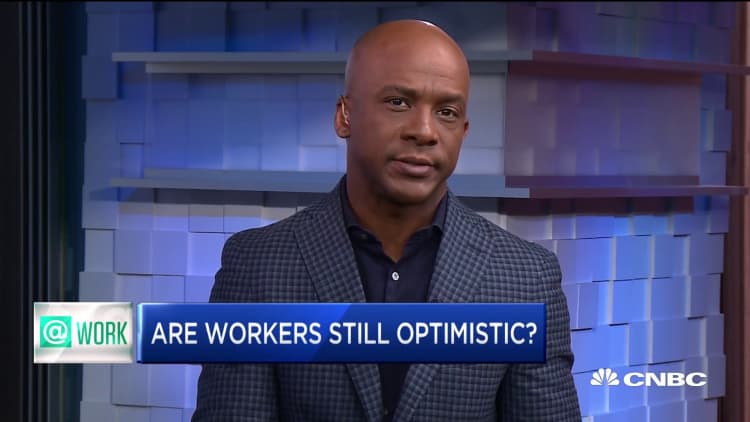Chipotle doesn't serve burritos, it "provides food with integrity." Facebook doesn't sell advertisements, it "bring[s] the world closer together." WeWork doesn't sublease office spaces, it "elevates the world's consciousness" (and it might not do that for much longer).
Why do these for-profit companies insist on selling themselves as such do-gooders? In part, they want to market themselves to potential consumers. But perhaps even more so, they want to motivate their workers.
In the latest CNBC|SurveyMonkey Workplace Happiness Survey, 69% of workers said it's "very important" to them to work for a company with clearly stated values, and 35% said "feeling that your work is meaningful" was the most important factor in their overall happiness at work. Humans crave meaningful relationships, and businesses have learned to capitalize on that emotion. By encouraging employees to see their work as fulfilling a higher purpose, they can try to retain workers by paying them in good vibes rather than dollars.
But trying to rally employees into a feeling of higher purpose at work misses something more fundamental: At root, people want to be compensated well for the work they do. Businesses that create a puffed-up company ethos but skimp on their most basic responsibility of paying their workforce well will end up with unhappy employees no matter how grandiose their company mission statement.
Defining happiness at work
In these latest survey results, workers ranked "being paid well" a distant second (21%) to "finding that your work is meaningful" in terms of what factor most determines their overall happiness at work. Those top two choices are followed by "having opportunities to advance" and "having control over how you do your work" (tied at 16% each), and finally "having colleagues who value your work" (11%).
Each of these five factors is one component that makes up the CNBC|SurveyMonkey Workplace Happiness Index; for simplicity, we refer to them as meaning, pay, opportunity, autonomy and recognition.
This wave of the survey was fielded from October 14–20 among more than 8,000 full- and part-time employed workers across the U.S. The results are remarkably stable from the previous wave of the survey three months prior.
In our index calculation, we give equal weight to each of these five factors, even though we know that the relative importance of each varies drastically from one individual to the next. Younger workers, for example, tend to value having opportunities to advance more than older workers.
In the overall results, the 14-percentage-point gap between those who prioritize meaning and those who prioritize pay is statistically significant and consistent over time, but it still may appear misleadingly strong. Despite the fact that "being paid well" trails "feeling that your work is meaningful," the truth is that workers only start to prioritize meaning when they feel they are well paid.
Four in 10 people (40%) who describe themselves as "not well paid" say that being paid well is the most important factor in their happiness at work—substantially higher than the 24% who say "feeling that your work is meaningful" is most important. These folks are generally unhappy at work: just 38% say they're satisfied with their job.
On the other hand, just 17% of people who are "very well paid" say that "being paid well" is the most important factor in their happiness at work. Twice as many people in this group (38%) say "feeling that your work is meaningful" is the most important factor for them. These workers are much happier, too: 94% say they're satisfied with their job.
These two groups — the very well paid and the not at all well paid — are mirror images of each other. Those who have plenty of money value it less; those who don't have enough value it more.
What this graph makes clear is that meaning isn't the universal top choice determining a person's happiness at work. It's important for sure, but it's a clear second-place finisher among workers who feel they are undercompensated.
That makes pay the crucial component of happiness at work — the foundation that is necessary before other pillars can be built. Once someone considers themselves to be at least somewhat well paid, they can focus on higher-level measures of satisfaction, like finding meaning in work or valuing the recognition they get from colleagues.
Being "well paid" is relative, not absolute
As actual income increases, people's aggregate scores of job satisfaction increase as well; on average just 39% of people making less than $50,000 per year say they're very satisfied with their jobs, compared with 64% of those making more than $150,000.
Still, at every income level, there are some people who consider themselves to be paid very well for the work they do, and some who don't. These survey results show that even within a particular income range, workers' perceptions of being well or poorly compensated indicate how much their happiness at work is determined by their pay.
Nearly everyone (95%) making less than $50,000 who describes themselves as very well paid also say they are very or somewhat satisfied with their job. Among those making the same amount of money but who say they are not well paid, just 63% are satisfied with their jobs. The same holds true at the other end of the spectrum: 95% of people making $100,000 or more who say they're very well paid are satisfied with their jobs, while 66% of those making the same amount of money but who feel underpaid say they're satisfied. Someone's relative feeling of being well paid is more important to job satisfaction that his or her actual salary.
What's even more remarkable is that at every income level, people who are more satisfied with their pay are less likely to say that being paid well matters most to them.
For example, among people making less than $50,000 per year, just 16% of those who describe themselves as "very" or "somewhat well paid" say that being paid well is the most important factor in their happiness at work; among those making the same amount of money who consider themselves "not so well paid" or "not at all well paid," that number is nearly double (30%).
Even among those making six-figure salaries, people who describe themselves as "not so well paid" or "not at all well paid" are still more likely than people who describe themselves as "very well paid" to say that pay matters most to them.
For more on tech, transformation and the future of work, join CNBC at the @Work Summit in New York on April 1–2, 2020.
Not all well-paid workers are happy at work, but there are no happy workers who are not well-paid. Businesses that prioritize paying their workers well will have happier workers overall, and they'll still have a chance to find their own meaning at work, too.
Adam Neumann, WeWork's recently-departed CEO, is the perfect embodiment of these contradictions. He may have built a company whose goal was to elevate the world's consciousness, but not before he made sure he was obscenely well paid. When the company crashed, his employees were left with underfunded severance packages — and it's hard to find meaning in a job you're not being paid to do anymore.
—By Laura Wronski, senior research scientist at SurveyMonkey, and Jon Cohen, chief research scientist at SurveyMonkey






